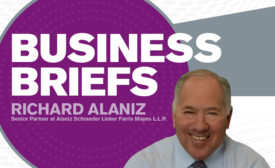Home » Keywords: » EEOC
Items Tagged with 'EEOC'
ARTICLES
Now is the time to review your policy and revise if needed
Read More
Dotting the I’s and Crossing the T’s: Employment Records You Must Have
Companies have significant responsibilities to create and maintain employee records
Read More
Best Practices in Employment Agreements
Well-written agreements can help companies and employees alike
Read More
The Department of Labor’s Focus on Supply Chains
How to Avoid Safety and Legal Compliance Problems
Read More
Obesity as a Disability: Complying with the Latest in ADA Rulings
Employers Need to Understand How the ADA Affects Their Workplace
Read More
Using Background Checks Wisely: Tips and Recommendations
One of the EEOC’s Areas of Focus Has Been Background Checks, Especially Criminal History
Read More
Copyright ©2024. All Rights Reserved BNP Media.
Design, CMS, Hosting & Web Development :: ePublishing




